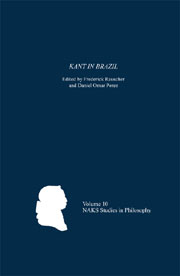Book contents
- Frontmatter
- Contents
- Acknowledgments
- Note on Sources and Abbreviations
- Introduction
- 1 Two Centuries of Kantian Studies in Brazil
- 2 Self-Consciousness and Objective Knowledge in the Transcendental Deduction of the Critique of Pure Reason
- 3 Intuitive Knowledge and De Re Thought
- 4 Predicative Judgments and Existential Judgments: Apropos Kant's Critique of the Cartesian Ontological Argument
- 5 An Experiment with Practical Reason
- 6 On the Faktum of Reason
- 7 Critique, Deduction, and the Fact of Reason
- 8 The Noncircular Deduction of the Categorical Imperative in Groundwork III
- 9 The Distinction between Right and Ethics in Kant's Philosophy
- 10 Right and the Duty to Resist, or Progress toward the Better
- 11 The Fundamental Problem of Kant's Juridical Semantics
- 12 Right, History, and Practical Schematism
- 13 Cosmopolitanism: Kant and Kantian Themes in International Relations
- 14 A Typology of Love in Kant's Philosophy
- 15 The Meaning of the Term Gemüt in Kant
- 16 Between Prescriptive Poetics and Philosophical Aesthetics
- 17 The Purposiveness of Taste: An Essay on the Role of Zweckmässigkeit in Kant's Critique of Aesthetic Judgment
- 18 Freedom in Appearance: Notes on Schiller and His Development of Kant's Aesthetics
- 19 Reading the Appendix to Kant's Critique of the Teleological Power of Judgment
- 20 Symbolization in Kant's Critical Philosophy
- Bibliography of Works in German and English
- List of Contributors
- Index
4 - Predicative Judgments and Existential Judgments: Apropos Kant's Critique of the Cartesian Ontological Argument
Published online by Cambridge University Press: 05 February 2013
- Frontmatter
- Contents
- Acknowledgments
- Note on Sources and Abbreviations
- Introduction
- 1 Two Centuries of Kantian Studies in Brazil
- 2 Self-Consciousness and Objective Knowledge in the Transcendental Deduction of the Critique of Pure Reason
- 3 Intuitive Knowledge and De Re Thought
- 4 Predicative Judgments and Existential Judgments: Apropos Kant's Critique of the Cartesian Ontological Argument
- 5 An Experiment with Practical Reason
- 6 On the Faktum of Reason
- 7 Critique, Deduction, and the Fact of Reason
- 8 The Noncircular Deduction of the Categorical Imperative in Groundwork III
- 9 The Distinction between Right and Ethics in Kant's Philosophy
- 10 Right and the Duty to Resist, or Progress toward the Better
- 11 The Fundamental Problem of Kant's Juridical Semantics
- 12 Right, History, and Practical Schematism
- 13 Cosmopolitanism: Kant and Kantian Themes in International Relations
- 14 A Typology of Love in Kant's Philosophy
- 15 The Meaning of the Term Gemüt in Kant
- 16 Between Prescriptive Poetics and Philosophical Aesthetics
- 17 The Purposiveness of Taste: An Essay on the Role of Zweckmässigkeit in Kant's Critique of Aesthetic Judgment
- 18 Freedom in Appearance: Notes on Schiller and His Development of Kant's Aesthetics
- 19 Reading the Appendix to Kant's Critique of the Teleological Power of Judgment
- 20 Symbolization in Kant's Critical Philosophy
- Bibliography of Works in German and English
- List of Contributors
- Index
Summary
Introduction
Considered in schematic form, the Cartesian a priori proof of the existence of God—defined by Kant as an ontological argument—contains two main stages: (a) the first derives knowledge of the reality of God's essence from the innate, clear, and distinct idea of God; while (b) the second derives knowledge of God's existence from knowledge of His essence.
In the second stage of the proof, the predicative proposition “God is existent” is deduced from the proposition “God is a supremely perfect being” and the supposition that existence is a perfection or a real predicate (a supposition explicitly admitted by Descartes in the Fifth Set of Replies), in the same way that the predicative proposition “God is omnipotent” could be deduced. But since the proposition “God is existent” means that God exists, the conclusion of the ontological argument is therefore an existential proposition.
Kant's refutation of Descartes' version of the ontological argument is based on the thesis that existence is not a real predicate. This thesis in turn leads to the argument that existential judgments cannot be assimilated to categorical judgments (predicative judgments), since categorical judgments represent an object with its properties, connecting different conceptual representations by means of the copula, while existential judgments signify that objects are actual instances of concepts.
- Type
- Chapter
- Information
- Kant in Brazil , pp. 81 - 97Publisher: Boydell & BrewerPrint publication year: 2012



